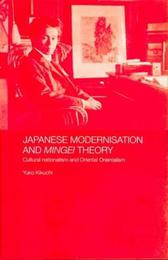
|
Japanese Modernisation and Mingei Theory: Cultural Nationalism and Oriental Orientalism
Hardback
Main Details
| Title |
Japanese Modernisation and Mingei Theory: Cultural Nationalism and Oriental Orientalism
|
| Authors and Contributors |
By (author) Yuko Kikuchi
|
| Physical Properties |
| Format:Hardback | | Pages:328 | | Dimensions(mm): Height 234,Width 156 |
|
| ISBN/Barcode |
9780415297905
|
| Classifications | Dewey:745.0952 |
|---|
| Audience | |
|---|
| Edition |
annotated edition
|
| Illustrations |
102ill.
|
|
Publishing Details |
| Publisher |
Taylor & Francis Ltd
|
| Imprint |
RoutledgeCurzon
|
| Publication Date |
20 May 2004 |
| Publication Country |
United Kingdom
|
Description
Conceptualised in 1920s Japan by Yanagi S=etsu, the Mingei movement has spread world wide since the 1950s, creating phenomena as diverse as Mingei museums, Mingei connoisseurs and collectors, Mingei shops and Mingei restaurants. The theory, at its core and its adaptation by Bernard Leach, has long been an influential 'Oriental' aesthetic for studio craft artists in the West. But why did Mingei become so particularly influential to a western audience? And could the 'Orientalness' perceived in Mingei theory be nothing more than a myth? Tracing the chronological development of Mingei theory from its beginnings in the 1910s to the end of the 20th century, Kikuchi deconstructs the Oriental 'myth' of Mingei by highlighting the complicit relationship between Japanese cultural nationalism and modern western Orientalism. Instead, she replaces the myth with an alternative perspective that focuses on the hybrid nature of the movement, from the formation of the theory on the basis of 'hybrid' modern ideas to its establishment in national, colonial and international discourses. This richly illustrated work offers controversial new evidence through its cross-cultural examination of a wide range of materials in Japanese, English, Korean and Chinese, bringing about startling new conclusions concerning Japanese modernization and cultural authenticity. This new interpretation of the Mingei movement will appeal to scholars of Japanese art history as well as those with interests in cultural identity in non-Western cultures.
|